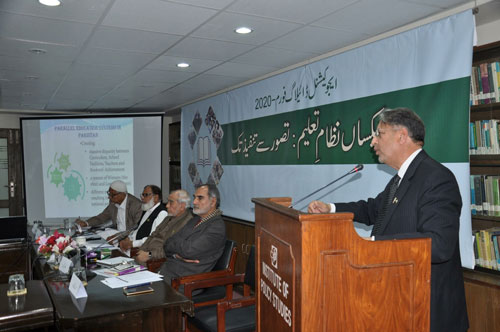Staff Reporter
While appreciating the work done so far for the development of a single national curriculum, academics and education policy experts deliberating at a day-long seminar were critical of the government’s approach for the purpose, advising it to make the consultation process more transparent and inclusive by engaging more stakeholders.
They also warned the government to be wary of certain elements who think a single national curriculum would strengthen local culture, history, values, and inhibit popularization of ‘secular’ thoughts; the elite who want their children to have an edge over children from other social classes; the recipients of foreign funding who want the Western culture to dominate the social and political arena of Pakistan, as well as the commercial interest groups.
Grave concerns were also expressed by the speakers over various other issues as well including malpractices and negative role of private publishers, equivalence of A-levels as intermediate without compulsory subjects of Urdu, Islamiyat and Pakistan Studies, and lack of any government body to regulate books of O and A levels currently being taught in Pakistan.
The deliberations were held during the Educational Dialogue Forum 2020 (EDF2020) themed ‘Uniform Education System: From Conception to Implementation’, which was organized by Institute of Policy Studies (IPS), Islamabad.
The seminar was addressed as chief guests by Sajid Hasan, former federal secretary for education, and Dr Anis Ahmad, vice chancellor, Riphah International University (RIU), whereas the main speakers included Muhammad Rafique Tahir, joint educational advisor, National Curriculum Council (NCC), Executive President IPS Khalid Rahman, Dr Mian Muhammad Akram, Dr Waqar Masood, Prof Rao Jalil Ahmed, Muhammad Hussain Malik, Dr Arshad Saeed Khan, Dr Muhammad Salim, Prof Mehr Saeed Akhtar, Dr Ameer Nawaz Khan and Dr Muhammad Sharif Nizami, among others.
The speakers were unanimous that the government’s efforts for the development of a uniform national curriculum was a step in the right direction for the country. This however should be done with proper backing of the constitution, strengthening the legal foundations of the process, taking input from more stakeholders and addressing the processes and responsibilities with more clarity.
The panelists also viewed that any work in the development of a single national curriculum should be preceded by the development of a comprehensive educational policy, outlining the aims of objectives of the curriculum in line with needs and requirements of the nation, also incorporating the medium of instruction, textbooks, teacher training and teaching methodology at length.
The speakers stressed that it was a constitutional obligation that Urdu should be promoted as a primary teaching tool as it will be far more effective for the cognitive learning of children, giving them a better opportunity to understand and excel. Many developing countries have experimented with and applied curriculum in their national language, which has proved to be to their advantage, they said.









